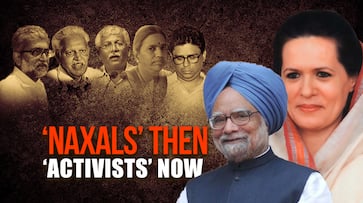With a mere 145 Lok Sabha seats, the Congress was lucky to have got a chance to rule the country in 2004. The communist support under UPA I and governance by the proxy of hand-picked NGO heads who became members of the extra-constitutional NAC under UPA II while making governance leftist still kept the Congress accountable. With a shrinking presence in Union and State legislatures since 2014, the party now couldn't care less if its acts threaten to disintegrate the nation.
On August 28, the Congress’s official handle tweeted a protest against the arrests of Sudha Bhardwaj, Arun Ferreira and Vernon Gonsalves, calling the state action “draconian” and “anti-democratic”. At least two of these three persons have spent long periods in custody during the UPA regime, under very similar charges. In particular, Vernon Gonsalves, one of the persons mentioned by name in the Congress’s tweet, had even been convicted in April 2014 by a Nagpur Sessions Court under the Arms Act, Explosives Act and Unlawful Activities (Prevention) Act. The principal case against him was connected to the recovery of a cache of dangerous items containing, among other things, nine detonators and 20 gelatin (gelignite aka jelly) sticks.
That India’s opposition party with a national presence could tweet in favour of such a person is amusing. It underlines how just four years in the opposition has pushed the Congress to embrace forces that are overtly and indisputably anti-national.
Nothing illustrates this better than the Congress’s changed stance on radical leftist intellectuals between 2013 and 2018. As per this report, which deserves to be read in full, the UPA government in 2013 submitted an affidavit before the Supreme Court where it said that such people “are in many ways more dangerous than cadres of the People’s Liberation Guerilla Army (PLGA),” the armed wing of the CPI-Maoist.
The affidavit also stated:
“These ‘mass organizations’ are generally manned by ideologues, who include academicians and activists, fully committed to the party line. Such organizations ostensibly pursue human-rights related issues and are also adept at using the legal processes of the Indian State to undermine and emasculate enforcement action by the security forces and also attempt to malign the state institutions through propaganda and disinformation to further the cause of their ‘revolution’’’.
That is about as comprehensive and lucid a definition of the term ‘Urban Naxal’ as possibly could be. It came from the Congress-led UPA government merely five years ago. Today the Congress tweets in favour of people convicted under the Arms Act and the Explosives Act.
Ergo, the party of Rahul Gandhi is no longer the Congress of your grandfather’s era. In fifty-five years of ruling over India, the Congress has committed countless sins of omission and commission. However, as long as the Congress remained the predominant political force, it also had the biggest stake in keeping the Indian republic together, preserving at the very least its territorial integrity.
All that changed in 2014. The party of Rahul Gandhi appears to have come to realise that the long arc of Indian politics has begun to curve away from the Congress. The party has become near irrelevant in several large States: Uttar Pradesh, Bihar, West Bengal, Andhra Pradesh, Tamil Nadu and possibly even Delhi. It is rapidly losing ground in Maharashtra, Karnataka and Haryana. There appears to be a general feeling of disgust towards the Congress across the Northeast. In multiple States such as Odisha and Telangana, where it technically still enjoys the status of the main opposition party, the Congress is having a difficulty being taken seriously by the electorate. It’s policy for 2019 is one of containment, not electoral conquest.
And as the Congress loses its stakes in governing India, the party seems to be opening its doors to forces that are expressly anti-national.
So who is to blame for the sorry state of affairs? Truth be told, the problems began in the Sonia Gandhi years. Having ‘won’ the 2004 election with just 145 Lok Sabha seats to its name, it was apparent that the era of Congress dominance was over. As such, it was Sonia Gandhi in consultation with her far left advisors who wielded power aided by the extra-constitutional National Advisory Council. With the party’s footprint having shrunk even more since 2004, it is likely that any future ruling dispensation that involves the Congress would make even more concessions to the far left.
But, without a doubt, the person who should bear the most blame is Rahul Gandhi. He lacks the ability to lead his party and is unable to give it a sense of direction. It is alarming that radical left-wing forces are stepping into the leadership and ideological void caused by Rahul’s vacuous intellect.
Rahul may wield his power over Congress workers and the wider left-liberal ecosystem in the name of great-grandfather, but this isn’t your the Congress your grandfather had told you stories about.
Last Updated Sep 9, 2018, 10:44 AM IST









![Salman Khan sets stage on fire for Anant Ambani, Radhika Merchant pre-wedding festivities [WATCH] ATG](https://static-gi.asianetnews.com/images/01hr1hh8y86gvb4kbqgnyhc0w0/whatsapp-image-2024-03-03-at-12-24-37-pm_100x60xt.jpg)
![Pregnant Deepika Padukone dances with Ranveer Singh at Anant Ambani, Radhika Merchant pre-wedding bash [WATCH] ATG](https://static-gi.asianetnews.com/images/01hr1ffyd3nzqzgm6ba0k87vr8/whatsapp-image-2024-03-03-at-11-45-35-am_100x60xt.jpg)


